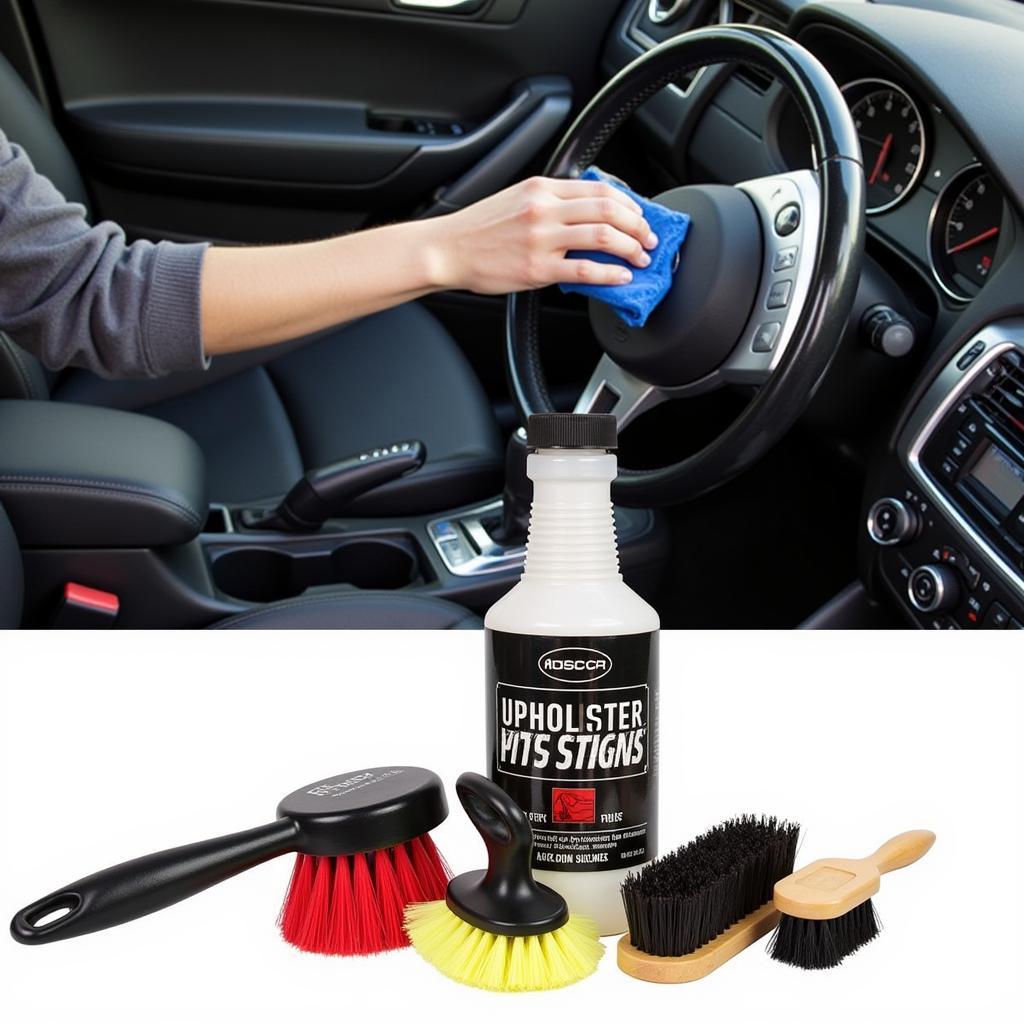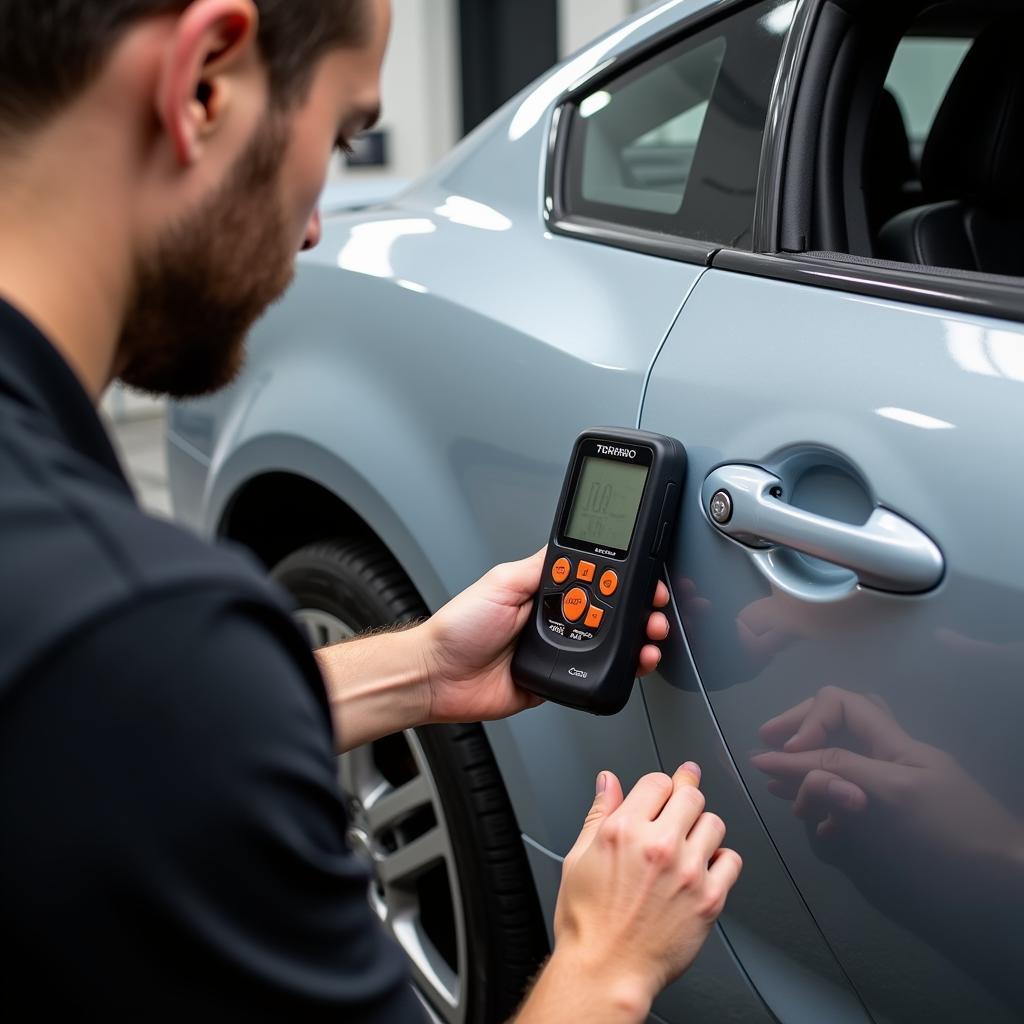Car detailing is more than just a simple car wash. It’s a meticulous process that restores and protects your vehicle’s appearance, inside and out. Achieving professional-level results requires the right tools and equipment. So, What Equipment Do You Need To Detail A Car? Let’s dive in and explore the essential kit for a stunning finish.
Essential Car Detailing Equipment: The Foundation for a Perfect Finish
Whether you’re a seasoned detailer or just starting out, certain tools are crucial for any car detailing project. These form the foundation of your detailing arsenal and enable you to tackle basic cleaning and surface preparation.
- Wash Mitts and Microfiber Towels: Forget sponges! Wash mitts and high-quality microfiber towels are gentler on your car’s paint, preventing swirl marks and scratches. Microfiber’s superior absorbency also means a cleaner, drier finish.
- Buckets (Two-Bucket Method): The two-bucket method is key to minimizing cross-contamination. One bucket holds your soapy water, the other clean rinse water. This helps prevent dirt and grime from being reapplied to your car.
- Car Wash Soap: Don’t use dish soap! Dedicated car wash soaps are pH-balanced and formulated to remove dirt without stripping away your car’s protective wax or sealant.
- Pressure Washer (Optional but Recommended): A pressure washer makes pre-wash and rinsing significantly faster and more efficient, blasting away loose dirt and debris.
- Drying Towels (Dedicated Drying Towels): These highly absorbent towels are specifically designed to quickly and effectively dry your car’s surface, minimizing water spots.
Stepping Up Your Game: Equipment for Paint Correction and Protection
Beyond the basics, specialized equipment allows you to address paint imperfections and protect your car’s finish. These tools can transform a good detail into an exceptional one.
- Clay Bar/Mitt and Lubricant: Clay bars or mitts remove embedded contaminants like tree sap and industrial fallout that washing alone can’t tackle. A dedicated lubricant ensures smooth gliding and prevents marring.
- Polisher (Dual Action or Rotary): Polishers correct paint imperfections like swirl marks and light scratches. Dual-action polishers are safer for beginners, while rotary polishers offer more cutting power for experienced users.
- Polishing Pads (Various Cutting Levels): Different polishing pads offer varying levels of aggressiveness, from heavy cutting to fine polishing. Choosing the right pad is crucial for achieving the desired results.
- Compound and Polish: Compounds are more abrasive and designed to remove deeper imperfections, while polishes refine the paint and restore its gloss.
- Wax or Sealant: Wax or sealant provides a protective layer against the elements, enhancing shine and making future cleaning easier.
- Applicator Pads: These pads are designed for applying wax, sealant, or other protectants evenly and smoothly.
Thinking about the costs involved? Check out our guide on how much to pay for car detailing.
Interior Detailing Equipment: For a Pristine Cabin
A truly detailed car shines inside and out. These tools are essential for cleaning and conditioning your car’s interior.
- Vacuum Cleaner (with various attachments): A powerful vacuum with crevice tools and brush attachments is essential for removing dirt and debris from carpets, upholstery, and tight spaces.
- Interior Detailing Brushes: Different brushes are designed for specific tasks, such as cleaning leather, vinyl, and delicate surfaces.
- Upholstery and Carpet Cleaner: These specialized cleaners lift stains and refresh fabric surfaces, leaving your car’s interior looking and smelling clean.
- Leather Conditioner: Leather requires specific care to prevent drying and cracking. A good leather conditioner keeps it supple and protected.
- Glass Cleaner: A streak-free glass cleaner is a must for crystal-clear windows and mirrors.
 Interior Detailing Brushes and Cleaner for a Spotless Cabin
Interior Detailing Brushes and Cleaner for a Spotless Cabin
Do you ever wonder how much tip for a car detailing? We have a guide for that too!
Advanced Detailing Equipment: Taking Your Skills to the Next Level
For those seeking the ultimate in car detailing, these advanced tools and equipment can elevate your results to a professional standard.
- Paint Thickness Gauge: This tool measures the thickness of your car’s paint, crucial information for safe and effective paint correction.
- Infrared Paint Curing Lamp: These lamps accelerate the curing process of ceramic coatings, reducing wait times and ensuring optimal performance.
- Steam Cleaner: A steam cleaner can deep clean and sanitize various surfaces, including upholstery, carpets, and even engine bays.
- Ozone Generator: An ozone generator removes stubborn odors, leaving your car’s interior smelling fresh and clean.
 Using a Paint Thickness Gauge during Car Detailing
Using a Paint Thickness Gauge during Car Detailing
For those considering detailing as a profession, find out how much money can you make detailing cars per car.
Conclusion: Equip Yourself for Detailing Success
Having the right equipment is essential for achieving professional-level car detailing results. By investing in quality tools and understanding their proper use, you can transform your car’s appearance and protect its value. Whether you’re a beginner or a seasoned pro, the right equipment empowers you to detail your car with confidence and achieve a truly stunning finish. What equipment do you need to detail a car? Now you know!
FAQ
- What is the most important piece of car detailing equipment? High-quality microfiber towels are arguably the most crucial, as they prevent scratches and ensure a clean finish.
- Do I need a pressure washer for car detailing? While not strictly necessary, a pressure washer greatly improves efficiency, especially during pre-wash and rinsing.
- What’s the difference between car wax and sealant? Wax provides a warm, natural shine and typically lasts a few months, while sealant offers more durable protection and a sleeker, more reflective finish.
- How often should I detail my car? Ideally, a full detail should be performed every 6-12 months, depending on driving conditions and environmental factors.
- Can I use household cleaners for car detailing? No, household cleaners are often too harsh and can damage your car’s paint and interior surfaces. Use dedicated car detailing products.
- What is the two-bucket method? The two-bucket method involves using one bucket for soapy water and another for rinsing your wash mitt, preventing cross-contamination.
- Is car detailing worth the cost? Yes, car detailing protects your car’s paint, enhances its appearance, and can even increase its resale value.
Looking for a comprehensive car inspection? Learn more about what are checked in detailed car inspection.
Need assistance? Contact us via WhatsApp: +1(641)206-8880 or Email: [email protected]. Our customer service team is available 24/7.

Leave a Reply